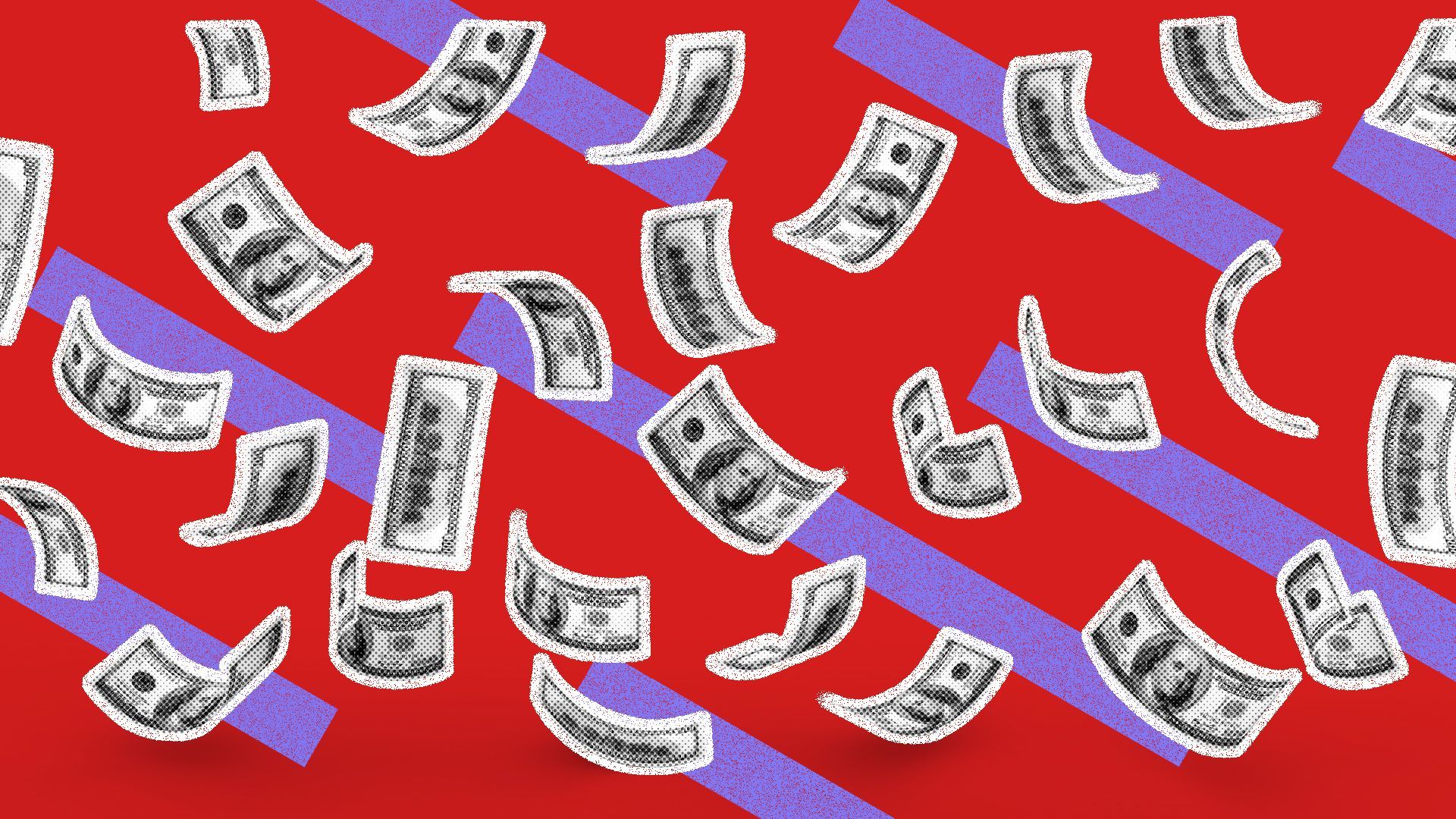| |
| |
| |
| Presented By Raytheon Technologies |
| |
| Axios Markets |
| By Courtenay Brown ·Dec 09, 2020 |
| ☕️ Good morning. I'm steering the ship while Dion takes time off. If this email was forwarded to you, sign up here. (Today's Smart Brevity count: 927 words, 3½ minutes.) 🗯 "It's more important to have the entire keyboard to play upon so you don't keep striking the same notes all the time." — Who said it and why it matters at the end of the newsletter. |
| |
| |
| 1 big thing: Share sale palooza |
 |
|
| Illustration: Aïda Amer/Axios |
| |
| The number of U.S. public companies turning to the equity markets to raise cash is at the highest level in at least 10 years, according to data by Dealogic provided first to Axios. Why it matters: The frenzy comes as companies (battered by the pandemic or not) seize on soaring stock prices to shore up cash. Flashback: Follow-ons — i.e., equity issuances after a company is already public— slowed to a near halt when the pandemic hit the U.S. in March. - But, amid the stock market rebound and as companies' capital needs skyrocketed, the number of issuances exploded shortly thereafter.
- In May and June there were 192 of these deals, according to a report last week from RBC Capital Markets. Put another way, more than one-third of all of 2019's follow-ons were in the span of two months alone.
Driving the news: Tesla said on Tuesday it would issue stock to raise cash for the third time this year. - It had raised about $2 billion in February and roughly $5 billion in September.
- Tesla now plans to raise as much as another $5 billion issuing more stock. Rather than do it all at once, Tesla will sell stock over time at its discretion. (Reminder: Tesla is set to join the S&P 500 in two weeks.)
What they're saying: Tesla is "raising enough capital to get the balance sheet and capital structure to further firm up its growing cash position and slowly get out of its debt situation," Dan Ives, a Tesla analyst at Wedbush Securities, wrote in a note to clients on Tuesday. - Elon Musk told the Wall Street Journal yesterday: "We thought we can retire debt and increase the security of the company … probably a good thing. And for less than 1% dilution, it probably makes sense. It could have gone either way."
The big picture: Tesla has taken advantage of the massive run-up in its share price, which is over 9 times higher than a year ago (adjusting for the stock split). - Three major airlines — JetBlue, United and American — all said they would raise capital through stock issuances in the last month. Little to no travel demand means these companies are burning millions of dollars per day.
- Airline stocks rebounded 32% in the past month as it became clear that vaccines would likely start being distributed before year-end, possibly speeding up a return to normal. (The stocks are still down 25% this year.)
|
    |
| |
| |
| Bonus chart: Secondary stock surge |
 Data: Dealogic; Note: Data includes follow-on and convertible bond deals; Chart: Andrew Witherspoon/Axios How it breaks down: There have been 797 follow-on deals so far this year — a record dating back to at least 2010. - There were also 175 convertible bond deals (which Dealogic tracks as equity issuance) — also the highest in at least the past decade.
|
    |
| |
| |
| 2. Catch up quick |
| The United Arab Emirates said the coronavirus vaccine developed by China's state-owned Sinopharm is 86% effective. (Axios) DoorDash's IPO priced at $102/share, higher than its upwardly revised $90–$95 per share range — valuing it around $39 billion. It starts trading today. (Axios) Cybersecurity firm FireEye says it was hacked by a "nation with top-tier offensive capabilities" — almost certainly Russia. (NYT) - The breach announcement came right after market close. Shares fell as much as 8% in after-hours trading.
The FTC sued to block Procter & Gamble's Billie acquisition — the second time this year officials cited competition concerns to stop a razor deal. (Bloomberg) |
    |
| |
| |
| A message from Raytheon Technologies |
| The future of aerospace and defense is here |
| |
 |
| |
| At Raytheon Technologies, nearly 200,000 engineers, scientists and researchers are pushing the limits of known science to explore deep space, advance aviation and build smarter defense systems that protect all of us here at home. That's the future of aerospace and defense. Learn more at RTX.com |
| |
| |
| 3. CFOs' stock market warning |
 Data: Deloitte CFO Signals survey; Note: Data excludes "neutral" responses; Chart: Axios Visuals 80% of CFOs say the stock market is overvalued, according to Deloitte's quarterly survey of Fortune 500 executives out this morning. Why it matters: The share fell by 4 percentage points from last quarter. Still, it remains among the highest levels in the survey's history. - 15% of CFOs said the U.S. equity market was neither overvalued or undervalued — slightly higher than last quarter, but well below the recent peak of 44% who said the same in early 2019.
What they're saying: "[T]o the extent that they believe it's valued properly or overvalued, that's going to have an impact on how aggressive they are with respect to funding acquisitions through equity," Deloitte's Steve Gallucci told reporters on Tuesday. - "I think many CFOs believe that at one point in time we'll have a pivot where the capital markets will be more aligned with the real economy."
Details: The majority of CFOs (60%) expect the stock market to be higher by the end of the year. On the economy: 18% rate the North American economy as good, while 26% say it is bad (an improvement from the 60% who called it bad last quarter). - 59% expect better conditions next year — up from the 43% in Q3.
- Perceptions of China's economy exceeded those of North America for the first time in Q3 — and the gap widened this quarter. Nearly half cite good conditions now, and 60% expect better conditions next year.
|
    |
| |
| |
| 4. Early COVID-19 anxieties are back |
 Data: Axios/Ipsos Poll; Chart: Andrew Witherspoon/Axios The Axios/Ipsos poll is tracking a return to anxiety levels and routines not seen in months, as experts warn that the pandemic will get worse before vaccines are widely available, Axios' Margaret Talev writes. By the numbers: In the poll of 1,101 adults taken Dec. 4-7... - More than seven out of 10 say returning to their normal pre-coronavirus life would pose a large or moderate risk to their health or well-being, while 22% say their household debt has increased in the last month — the highest shares for both questions since April.
- People are more stressed about their finances than they've been since the summer. 46% are now worried about job security, and 47% are worried about paying the bills.
- And 15% say it's getting harder to pay the rent or mortgage, the highest since August.
- Only about three out of 10 say they've gone out to eat in the last week, the lowest since late June.
My thought bubble: None of this bodes well for the fragile U.S. economy, which is showing signs of a stalling recovery. |
    |
| |
| |
| A message from Raytheon Technologies |
| The future of aerospace and defense is here |
| |
 |
| |
| At Raytheon Technologies, nearly 200,000 engineers, scientists and researchers are pushing the limits of known science to explore deep space, advance aviation and build smarter defense systems that protect all of us here at home. That's the future of aerospace and defense. Learn more at RTX.com |
| |
| 📧 Thoughts, questions, concerns or funny memes? Shoot me an email at: courtenay.brown@axios.com. See you tomorrow. Quote: "It's more important to have the entire keyboard to play upon so you don't keep striking the same notes all the time." Who said it: Charles Schulz, the creator of the legendary "Peanuts" comic strip, explaining why he didn't want to spinoff any of the characters for a standalone comic in an interview with Charlie Rose in 1997. - "A Charlie Brown Christmas," the first "Peanuts" animated special, premiered on CBS 55 years ago today.
|







No comments:
Post a Comment